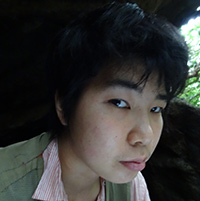TANIGUCHI, Haruka

Research Associate
Research Institute for Languages and Cultures of Asia and Africa,
Tokyo University of Foreign Studies
3-11-1 Asahi-cho, Fuchu-shi,
Tokyo, 183-8534, Japan
Email: taniguchi8[at]aa.tufs.ac.jp
Personal Homepage:
Research interests: primates, co-feeding relationship, intraspecific differences, process of socialization, evolution of sociality
Studying the effects of habitat differences on the co-feeding relationships of weaning infant primates
I study the effects of habitat differences on infants’ co-feeding behavior by comparison between sites. Infancy is a significant period of the primate’s life wherein social relationships are expected to develop with other group members. In gregarious primate species, weaning infants develop co-feeding relationships with group members. Weaning infants eat food items that are easy to access and process more than their mothers do, and thus, their mothers may not always be suitable co-feeding partners for the infants. Throughout the study, it was observed that the physical properties of food items (i.e., food size, need for processing, height, and fracture toughness) could affect the co-feeding partner of infants. Possible changes in the co-feeding behavior of infants due to habitat differences (food condition and climate) were also suggested. Therefore, the habitat environment may affect the process of infants’ socialization.
Recent Interests:
For my next study, I am planning to examine the influence of social structure on the process of socialization, specifically on the feeding situation in primates. This will be conducted by investigating the intraspecific differences in the social structure of Japanese macaques. In non-human primates, several studies have suggested that social structure affects the process of socialization (e.g., the formation of dominance rank) by interspecific comparisons. Investigating the relationship between social structure and the process of socialization is important to consider how social attitudes toward other individuals (e.g., the degree of tolerance) are reproduced within the population. Finally, I want to discuss the evolution of sociality in primates, including human.
Research Projects:
br />Related Sites
Copyright © 2010 Research Institute for Languages and Cultures of Asia and Africa. All Rights Reserved.
